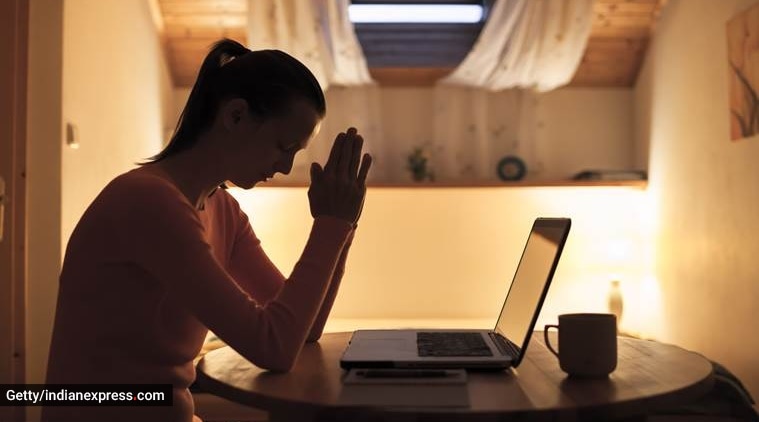Compartmentalise stress. Respond to it one at a time. The ones we can do something about, and the ones we have no control over. Deal with it one blow at a time

“We didn’t think we would see a crisis like this in our lifetime,” is what I hear on repeat during my sessions. And I couldn’t agree more. The virus has not just infected a significant percentage around the world, but exposed a way larger percentage to unimaginable stress.
The elevation in reports of transient anxiety, situational depression, obsessive thinking, psychosomatic illnesses, panic attacks, suicides, domestic violence and general psychological distress have skyrocketed. Within a few months, the crisis has hit us over and over again. Within a few months, we have endured emotions like shock, grief, fear, panic, sadness, anger, isolation, confusion, trying to keep our heads above the water as the next wave raises its hood over us. We seem to be in the eye of a storm that refuses to calm down. Surely, such a time was never imagined by any of us.
According to the new edition of the Diagnostic and Statistical Manual of Mental Disorders (DSM-5), one may experience situational depression if they have emotional or behavioural symptoms that develop within three months of a stressful life event. Sadly, the pandemic now has been around long enough for a lot of people to be diagnosed with this or to put them on psychiatric treatment for symptomatic relief.
ALSO READ | Matters of the mind: Self-esteem, society and socialising
While we work against time to find a vaccine for the virus, we need to pay attention to the aftermath of this pandemic, as it continues to push a large population into emotional despair and mental disease. While the priority is to reduce fatality, and control the spread of Covid-19, can we not start work on reducing, controlling and preventing mental illness, that is fast reaching alarming numbers? Our response to the crisis, our readiness and recovery, is what I see as some solutions and want you to think about.
A psychological crisis is a life event that an individual perceives as stressful to the extent that normal coping mechanisms are insufficient. And today, we find ourselves coping with multiple crisis situations.
The threat of a deadly virus, loss of jobs, economic ambiguity, loss of loved ones, not being able to tend to sick family members, bad news from world over, social isolation, hunger and racial violence, is constantly around us.

While we feel like sitting ducks in the viral invasion, figuring out work and finances, with vulnerable parents and kids at home, we are bound to feel the heat compounding by the day. We are bound to be overwhelmed.
Can we change this passive or reactive endurance of stress? Can we respond to crisis in ways that can not only help us cope, but also ready us for more? Can we fight better?
ALSO READ | Matters of the mind: Caution, courage and rationality may be answers to the crisis
I suggest a three-dimensional defence strategy :
Response
Stress is an evolutionary healthy response of our body to fight back. Over the years, we started to respond in the same way to imagined or perceived stress (eg. “my boss doesn’t like me”), along with any other real stress that came our way (eg. job loss), but it wasn’t really a sabre-toothed tiger. So even thinking of a stressful situation, imagining a loss, perceiving threat, we release the same stress hormones that we would when we had to run for our life to save ourselves from becoming a wild animal’s lunch. These stress hormones reduce our immunity, make us hyper alert to fight or flight, stop other processes that don’t seem urgent to deal with (growth, thinking, reproduction, etc) and cause psychological symptoms, which is what is causing the elevated transient anxiety and situational depressive disorders.
Honestly speaking, we have been living with stress. Relationships, work, finances, or all of these, we already had bucket loads of cortisol in our bodies. The reason we are bending at our shins is because we didn’t deal with that and now there is ship loads more! Stress is recurrent, acute and fast becoming chronic.
So the first thing I suggest is to compartmentalise stress. Respond to it one at a time. The ones we can do something about, and the ones we have no control over. Deal with it one blow at a time.
Come to think of it, until we see a tiger we do not need to run. I can thus also suggest differentiating between real and perceived threats. Unless the virus gets us, let us give our cortex and adrenals a break and not think we have it, by imagining it. Yes, it’s lurking around, but we do not need to respond until we really face it.
Our body also self-regularises with the help of a few techniques. Breathing, yoga and meditation release pleasure hormones, increase oxygen in the tired brain and create a healthier environment in our bodies, in other words, beat the response to stress. Exercise, healthy eating, adequate sleep and purposeful activity are all associated with happy neurotransmitters!
Solutions are not some precious undiscovered vials of antidote or antiviral shots, locked up under high-security vaults, they are in our minds and our lifestyles. Reverse stress consequences by not reacting, not running, respond by breathing and analysing, rationalising and recognising real versus perceived threats. When the stress is real and close, be rest assured you will survive with the help of the surge of an effective well-rehearsed response to stress.
ALSO READ | Matters of the mind: For seniors feeling anxious during Covid-19, here is how to dig deep and stay strong
Resilience
This is truly a tough time to talk about this, develop it and practice it. But it is also true that no one develops resilience in good times. It is not a trait or gene that makes you resilient, doesn’t run in families and sadly is not contagious. It needs to be experienced and practiced against the tide, against every tired bone, nerve and sinew in our hurting bodies and it needs to be committed to. Resilience is our resolve and ability to keep our eyes on the road, our chin up, to fight or float, to persevere, not once not twice but every time something takes you down.

I often get asked in therapy by patients, “Doctor, why me?” And my answer is, “Why not you?” It is the acceptance that bad things can happen to us, the understanding that we are not beyond the reach of pain, misfortune or suffering. It is the readiness to face that hit with a prepared mind and strong commitment to bounce back. Resilience needs rationality. It needs us to shift focus on what is okay, better, not bad or actually good in what is happening. Since resilience is a way of perceiving life it readies you not just for one crisis, but for whatever comes your way. All you have to do is look within and open up that will and determination to keep yourself afloat.
Recovery
It is such a powerful word, and I wish I could talk about recovery from deadly viruses. Sadly, that will take some time. What I mean by recovery here though is that if we choose lessons and growth from pain, distress and disaster, we can recover. Recovery is about dropping your past or better yet, learning from it, in both cases, shifting the focus to our present. A time zone we need to invest in if we want to feel alive and able. Recovery doesn’t mean healing. It means learning. It doesn’t mean absence of stress, it means acceptance of stress. It doesn’t mean gaining control, it means embracing the lack of it. Spiritual growth and mindfulness is recovery. When a patient comes to me for grief counselling after losing a loved one, it is not that the departed comes back. When a person gets depressed over a relationship lost, I do not guarantee that things will change. When a lady suffers PTSD post a sexual assault, and seeks help, it is not that I can erase the abrasions and violation. But they do recover. And that happens with a resolve to let go, to accept the pain, to live the journey, to learn, to grow, to adapt and to choose to keep going without carrying the burden of the crisis.
Bombarded with news of death and distress around us, occupation loss, sadness and frustration within family, friends, the community and the world, no end in sight and pain coming in waves, our responses need to aim at survival, staying afloat, hope and resilience. The grit that we are ready and will bounce back no matter what, as the human race has through thousands of calamities, wars, tsunamis and earthquakes. And as far as recovery is concerned, the way you define it will make all the difference.
(The author is a Mumbai-based psychologist and psychotherapist)
For more lifestyle news, follow us: Twitter: lifestyle_ie | Facebook: IE Lifestyle | Instagram: ie_lifestyle
? The Indian Express is now on Telegram. Click here to join our channel (@indianexpress) and stay updated with the latest headlines
For all the latest Lifestyle News, download Indian Express App.
Source: Read Full Article


